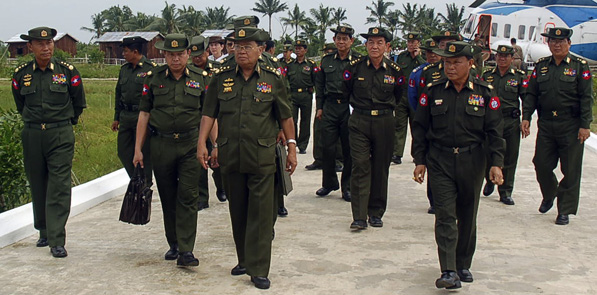Escaping the Traps of the Past

In this context, it is important to note that although the NLD decision not to contest the election was probably the right one, the party was wrong not to diversify its pro-democracy struggle and avoid an internal split by setting up or at least allowing a proxy party to exist. Unfortunately, without Suu Kyi, the other NLD leaders seem incapable of articulating or implementing any political program or strategy. They often seem narrowly focused on party survival, merely biding their time until Suu Kyi’s release from house arrest without having any further agenda.
With Suu Kyi at the helm, the party appears to have some direction, but it is still prone to poor political timing. Since rising to prominence as the leader of the democratic opposition, Suu Kyi has made a number of unfortunate judgment calls that have had lasting consequences.
These include her direct confrontation with former dictator Ne Win in 1989, at a time when he still wielded considerable power behind the scenes; her premature public disclaimer that she was not making any secret deals with the regime soon after holding talks with Than Shwe in 1994; her announcement of plans to boycott the National Convention less than two months after a visit by then US Secretary of State Madeleine Albright in 1995, raising the regime’s suspicions of a conspiracy and hindering future trust-building efforts and possible negotiations; and her decision in 2003 to travel at night through hostile areas, including Depayin, despite warnings of possible violent attacks. Although Suu Kyi and her party are certainly not responsible for the regime’s subsequent actions on these occasions, these examples of past missteps do serve to illustrate the lack of strategic thinking on the part of the NLD and its leader.
Despite its history of misjudgments and recent forcible disbandment, however, the NLD remains a potent force in Burmese politics. For its part, the junta seems content to contain the party’s influence ahead of the election, while the NLD itself also appears to be in a holding pattern, waiting for Suu Kyi’s release, which is scheduled to take place less than a week after the election.
Thus both sides are strangely in synch, for the most part avoiding open confrontation while no doubt anticipating a future showdown.
Again, however, this approach betrays the NLD’s weakness at formulating plans of action that are likely to lead to real results. In this case, the price of losing sight of the potential for marginal gains, including additional opportunities to reach out to the public, recruit new members and mobilize resources, could be even greater than in the past.
By failing to offer an alternative to the regime’s relentless drive to legitimize itself under the guise of elections, the party risks losing its moral authority as the leading light of the democracy movement, without which it has precious little in the way of political capital. Although two decades of absolute military rule have been far from kind to the NLD, there’s no reason to believe that the messy post-election political scene, which will likely be fraught with political violence, corruption and political alliances between crooks, cronies and accused war criminals, will be any kinder. By taking a “purity-seeking” stance, the party could find itself in the wilderness of permanent opposition status for many more years to come.
Of course, the NLD is not alone in facing some hard choices at this juncture in Burmese history. The parties that have opted to contest the election are also going to have to navigate their way carefully around the many pitfalls that still await them. The ethnic parties are in a particularly precarious situation, as their efforts to win a place at the table come amid a deteriorating security situation that threatens to throw Burma back to the bad old days of life before the multitude of cease-fire agreements that have been in place for most of the past two decades. Even if these deals hold and the ethnic parties win a few seats in parliament, elected leaders will be hard-pressed to improve the lot of their constituents in an environment where military-owned businesses, junta cronies, foreign investors and ethnic drug lords and elites plunder natural resources without regard for the long-term needs of ordinary citizens.
The international community will also have to decide where it stands on the outcome of the election. At the moment, it looks like most countries will simply fall back on their established positions, with perhaps some softening of the stances of a few longstanding Western critics of the regime.
« previous 1 | 2 | 3 next page »
|
||
|
||
|
||
|
||
